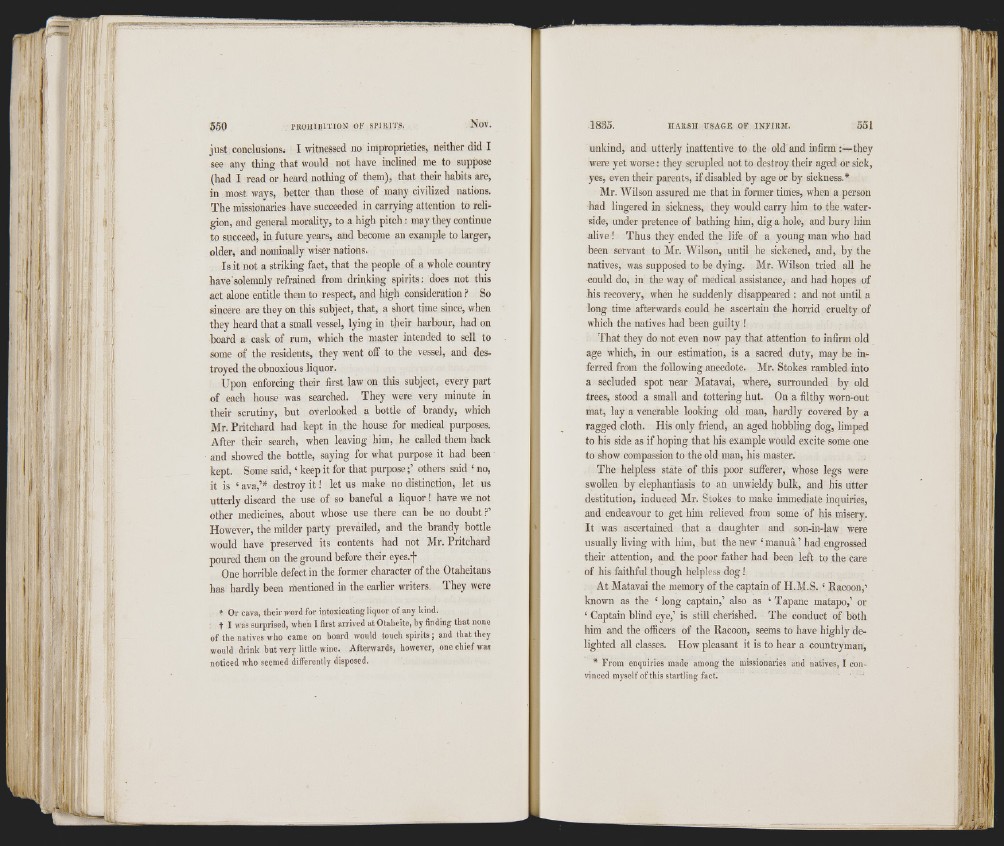
iM
I Jl
r* ' I ' T
just conclusions. I witnessed no improprieties, neither did I
see any thing that would not have inclined me to suppose
(had I read or heard nothing of them), that their habits are,
in most ways, better than those of many civilized nations.
The missionaries have succeeded in carrying attention to religion,
and general morality, to a high pitch: may they continue
to succeed, in future years, and become an example to larger,
older, and nominally wiser nations.
Is it not a striking fact, that the people of a whole country
have'solemnly refrained from drinking spirits: does not this
act alone entitle them to respect, and high consideration ? So
sincere are they on this subject, that, a short time since, when
they heard that a small vessel, lying in their harbour, had on
board a cask of rum, which the master intended to sell to
some of the residents, they went off to the vessel, and destroyed
the obnoxious liquor.
Upon enforcing their first law on this subject, every part
of each house was searched. They were very minute in
tbeir scrutiny, but overlooked a bottle of brandy, which
Mr. Pritchard had kept in the house for medical purposes.
After their search, when leaving him, he called them back
■ and showed the bottle, saying for what purpose it had been
kept. Some said, ‘ keep it for that purposeothers said ‘ no,
it is ‘ ava,’* destroy i t ! let us make no distinction, let us
utterly discard the use of so baneful a liquor ! have we not
other medicines, about whose use there can be no doubt.?’
However, the milder party prevailed, and the brandy bottle
would have preserved its contents had not Mr. Pritchard
poured them on the ground before their eyes.f
One horrible defect in the former character of the Otaheitans
has hardly been mentioned in tbe earlier writers. They were
• Or cava, their word for intoxicating liquor of any kind.
: + I was surprised, when I first arrived at Otaheite, hy finding that none
of the natives who came on board would touch spirits ; and that they
would drink hut very little wine. Afterwards, however, one chief was
noticed who seemed differently disposed.
unkind, and utterly inattentive to the old and infirm :—they
were yet worse: they scrupled not to destroy their aged or sick,
yes, even their parents, if disabled by age or by sickness.*
Mr. Wilson assured me that in former times, when a person
had lingered in sickness, they would carry him to the waterside,
under pretence of bathing him, dig a hole, and bury him
alive ! Thus they ended the life of a young man who had
been servant to Mr. Wilson, until he sickened, and, by the
natives, was supposed to be dying. Mr. Wilson tried all he
could do, in the way of medical assistance, and had hopes of
his recover}', when he suddenly disappeared : and not until a
long time afterwards could he ascertain the horrid cruelty of
which the natives had been guilty !
That they do not even now pay that attention to infirm old
age which, in our estimation, is a sacred duty, may be inferred
from the following anecdote. Mr. Stokes rambled into
a secluded spot near Matavai, where, surrounded by old
trees, stood a small and tottering hut. On a filthy worn-out
mat, lay a venerable looking old man, hardly covered by a
ragged cloth. His only friend, an aged hobbling dog, limped
to his side as if hoping that his example would excite some one
to show compassion to the old man, his master.
The helpless state of this poor sufferer, whose legs were
swollen by elephantiasis to an unwieldy bulk, and his utter
destitution, induced Mr. Stokes to make immediate inquiries,
and endeavour to get him relieved from some bf his misery.
It was ascertained that a daughter and son-in-law were
usually living with him, but the new ‘ manua ’ had engrossed
their attention, and the poor father had been left to the care
of his faithful though helpless dog!
At Matavai the memory of the captain of H.M.S. ‘ Racoon,’
known as the ‘ long captain,’ also as ‘ Tapane matapo,’ or
‘ Captain blind eye,’ is still cherished. The conduct of both
him and the officers of the Racoon, seems to have highly delighted
all classes. How pleasant it is to hear a countryman,
* From enquiries made among the missionaries and natives, I convinced
mj'self of this startling-fact.
I